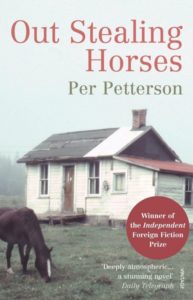“You decide when it will hurt,” chides a father to his son in Per Petterson’s novel Out Stealing Horses.
The novel, set in the Norwegian forest in both the present day and in 1948, is a tender look at human relationships and the forces that determine how we, as individuals, are defined.
Petterson has become one of Norway’s most popular novelists, but it was not an easy road. In 1990, his parents, his brother, and a nephew were killed in a fire that was deliberately set onboard a ferry. Then there were the 17 years between when Petterson decided he wanted to become a writer and his first publication. “It was a kind of grief,” he once said, “the grief of not being a novelist when that was all I wanted to be.”
Most of Petterson’s characters are beset by a similar kind of yearning. It is deeply felt, like homesickness, but what is longed for is not an old familiar place but an old familiar self that has been lost over the course of a lifetime, or has yet to be encountered.
Out Stealing Horses is narrated by Trond, who, in his 60s, has recently moved to a cottage in the countryside to escape the tragedies that hounded his former life. His neighbour, also in his 60s and living alone, triggers in Trond memories of his father and the last vacation they spent together in the summer of 1948.
Petterson was influenced by the existential philosophy of Jean Paul Sartre. When it comes to defining the self, Sartre said, “existence precedes essence.” This well sums up Trond’s situation. He encounters himself at age 60-something and realizes that although he most certainly exists, he has lost the essence that defined him as a boy all those years ago.
And yet the existential crises that Petterson inflicts on his characters are not hopeless or despairing. “After all,” repeats Trond at the end of the novel, “you decide when it will hurt.”
Per Petterson must-read:
Out Stealing Horses
(Public Library, Oak Bay branch Adult Fiction)

